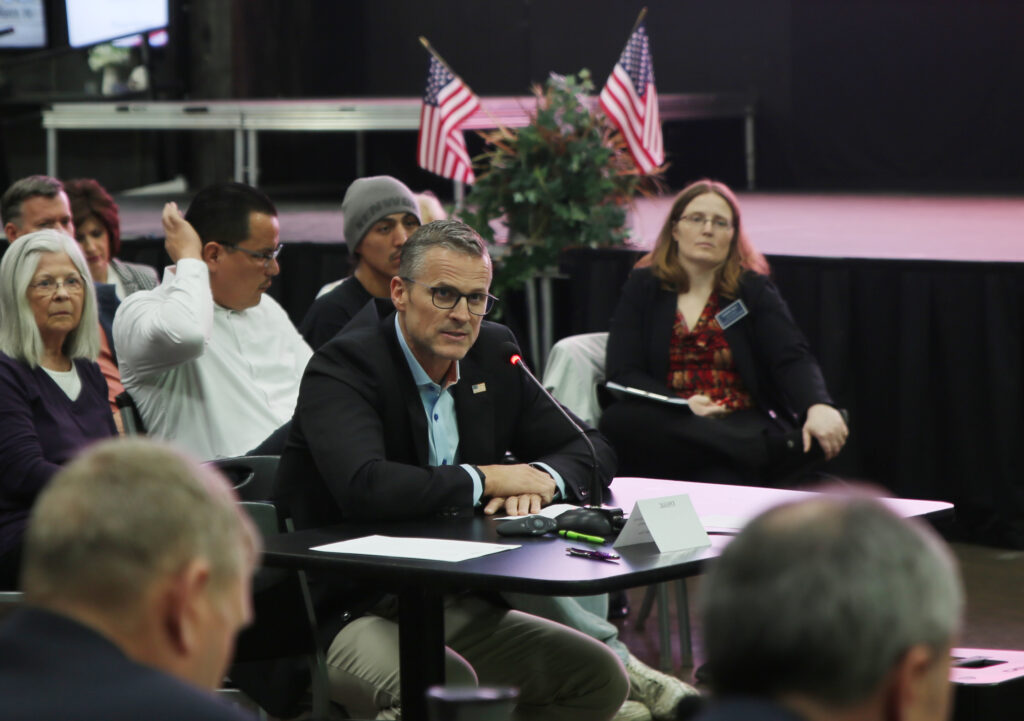
Sioux Falls Mayor Paul TenHaken speaks to the Project Prison Reset group on April 3, 2025, at the Military Heritage Alliance in Sioux Falls. (John Hult/South Dakota Searchlight)
Sioux Falls Mayor Paul TenHaken said Thursday that the city needs to cut its operating expenses by $8 million to $10 million over the next three years because of new state caps on property tax growth.
The state Legislature and Gov. Larry Rhoden passed the caps during the annual legislative session that ended in March. The multifaceted law includes a five-year, 3% cap on countywide growth in owner-occupied home assessments, plus other provisions such as expanded eligibility for an assessment freeze program for elderly and disabled people.
Cities receive revenue from sales taxes and property taxes. Counties and schools receive property taxes, and the state receives sales taxes.
Rhoden signs property tax relief bill with eye toward another solution
TenHaken said in a news release that the law “will impact the way we deliver some city services in the future.”
“For Sioux Falls and our surrounding communities that comprise about one-third of the state’s population and drive our collective population and economic growth,” he said, “it’s important to understand how state legislation has the potential to restrict our ability to provide important public services as we grow.”
The city’s general fund, which receives property tax revenue, accounted for about $250 million of the city’s total $773 million budget this year, according to the news release. Within the general fund, 64% of expenses go to employee wages and benefits, while the remaining 36% goes toward operational costs for city services.
The general fund pays for city services including public safety, street maintenance, parks, pools, libraries, public health efforts, and planning and development.
TenHaken’s announcement came on the same day as a meeting of the Legislature’s Comprehensive Property Tax Task Force. The task force is studying additional ways to lower property taxes, with an eye toward proposing legislation next winter.
The mayor alluded to those efforts in his news release.
“In the end, it’s pretty simple,” TenHaken said. “An imposed property tax reduction or elimination without an alternate stable revenue source will lead to a reduction in the current level of city services Sioux Falls residents receive.”
TenHaken said he has worked with city departments to find targeted savings and avoid across-the-board cuts. The mayor will make a 2026 budget presentation at 3 p.m. July 24 at Carnegie Town Hall, 235 W. 10th St. The Sioux Falls City Council will consider the proposed 2026 budget in September.
Proposed Sioux Falls budget cuts
A news release from the city of Sioux Falls said Mayor Paul TenHaken and department heads have so far identified $6 million of reductions for the 2026 proposed budget, including:
General Government and Operations
- Part-time and consulting alignment.
- Full-time workforce (3 FTEs eliminated: Mayor’s Office (1), Attorney’s Office (1), and Communications (1)).
- Reduction of funding for subsidy agreements.
Culture and Recreation
- Library hours of service reduction for Sioux Falls and Brandon locations (up to two hours per day).
- Outdoor pool closures after the first weekend in August.
- Reimagine Midco Aquatics concession offerings.
- Evolve the playground recreation program to incorporate the mobile recreation unit.
- Phased closure of non-refrigerated outdoor ice rinks.
Streets, Planning and Development
- Alignment of de-icing materials.
- Phasing in city-owned motor graders.
- Extend equipment replacement cycles and reduce equipment rentals.
- Credit card fees shifting to customers who choose to use this form of payment.
Public Safety and Health
- Public Health Grants expired (3 public health full-time employees reduced).
- Health clinic collaboration with community partners and streamline citywide code enforcement.
- Police and Fire overtime reduction strategies.
- Police tracking team and grant-funded coordinator eliminated; training reduced.
- Fire program supplies and training reduced.


